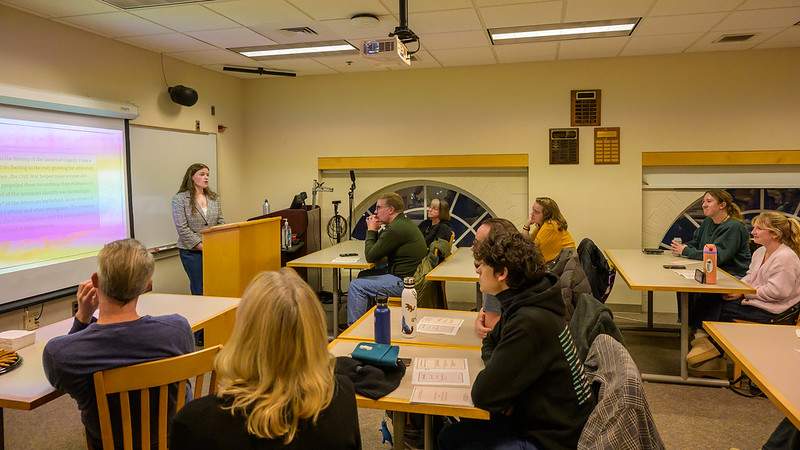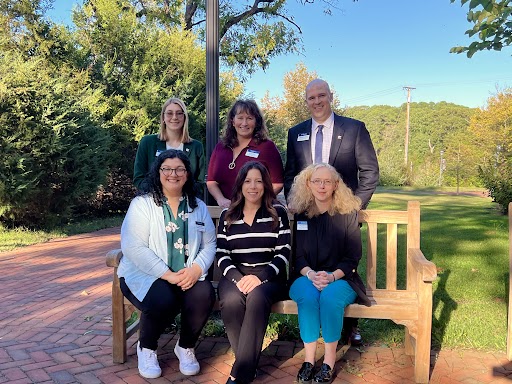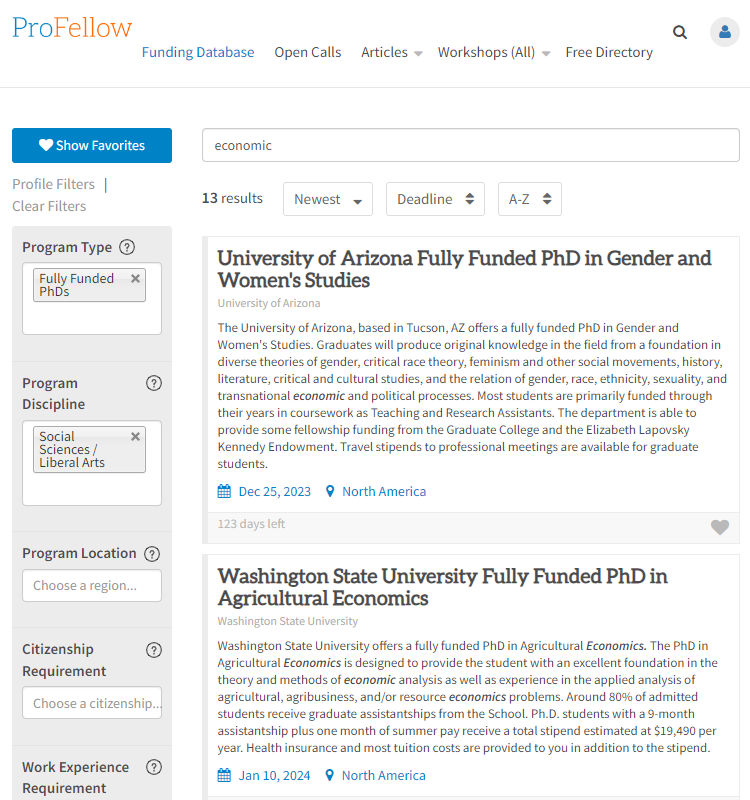
QUICK LINKS
WHAT IS GRADUATE SCHOOL?
Graduate school is an opportunity to advance your education in your specific field of interest after you complete your bachelor’s degree. The content and length of graduate school programs vary depending on the school or field of study, but a full time graduate program typically takes 2–4 years of study. There are a variety of graduate programs available, including the following examples.
Masters degrees
Typically 1.5–2 years. Examples:
- Master of Art, (M.A.)
- Master of Science, (M.S.)
- Master of Fine Arts, (M.F.A.)
- Master of Business Administration, (MBA)
Doctoral degrees
Typically 4–6 years. Examples:
- Doctor of philosophy (Ph.D.)
- Juris doctor (J.D.)
- Doctor of medicine (M.D.)
- Doctor of dental surgery (D.D.S.)
Graduate certificates
Typically 6–12 months. Examples:
- Data Analytics Certificate
- International Relations Certificate


Questions to ask yourself
During your first year and sophomore year ask yourself the following questions:
- Why am I interested?
- When do I want to go?
- Reasons to go right away?
- Reasons to wait?
- What personal experiences do I have that fueled my interest in [choice of field]?
- Do I have practical experience with [field] that:
- Has helped me commit myself to the challenge of fulfilling the necessary coursework required for a graduate program?
- Will strengthen my application to graduate work by giving me hands-on experience and demonstrate that I am fully aware of what the career I have chosen involves?
- Am I committed to strive for a GPA of 3.5 or higher?
- The minimum GPA required for graduate school varies by program and school, but is typically around a 3.0-4.0 scale. However, successful applicants to competitive programs often have GPAs in the 3.5–4.0 range. STEM fields may have higher GPA expectations than other disciplines.
Make sure to look into several programs and decide which is the best fit for you. Start building your support network and cultivate relationships with those that can help you with the application process.
SHOULD I GO TO GRADUATE SCHOOL?
Yes, if …
- It will it help me qualify for promotions or higher-paying positions
- It will it help me build knowledge, skills, and experience I need for my future career
- It will prepare me to change careers
- It is required for the job I want
- It is clear that grad school will give me a positive return on my investment—is it worth the money, time and effort?
If continuing your educations fulfills one or more of the above, grad school may be a great choice for you!
No, if …
- I want grad school to help me figure out what career I want to pursue
- You should have a specific career goal in mind before you apply for grad school—they will ask this on the application.
- I want to delay career decisions or life responsibilities
- Delays won’t make life easier; without clear goals it’s harder to stay and graduate; and you may end up with debt.
If you are considering continuing your education for the above reasons, grad school may not be the best choice for you.

HOW DO I FIND A GRADUATE PROGRAM?
To find a graduate program that fits your needs, try one of the following:
1. Run a Google search that matches your interests. For example:
- “master’s degrees in child psychology”
- “doctorate in marine biology”
- “master of fine arts”
2. Try ProFellow, a free database of funding for graduate school programs. You can use it to search and bookmark more than 2,500 fellowships and fully funded graduate programs. They also publish articles with application tips written by fellows, features and interviews with current and former fellows, and fellowship calls for applications.
Programs include:
- Undergraduate: Undergraduate fellowships, summer fellowships
- Masters: Fully funded masters, master’s fellowships
- Doctorate: Fully funded PhDs, doctoral fellowships
- Professional/post-doctorate: Professional fellowships, post-doctoral fellowships
You can use search filters to refine your search and results.
For more information on finding fellowships on ProFellow, see their article on How to Find Fully Funded Graduate Programs in Any Discipline.
3. See The Princeton Review, another great resource for finding graduate schools and programs. You can search by name, state, program, enrollment size, institution type, or featured schools. Creating a free account lets you save your favorite schools, and request information directly from your school of interest.

HOW DO I PICK THE RIGHT SCHOOL FOR ME?
To find a grad school that best fits your needs, start by considering:
- If the program is tailored to your interests and preferences
- The application requirements
- Cost of tuition/financial aid opportunities
- Program resources
- Location of school
- Reputation and accreditation
Though choosing to pursue your graduate studies is often a great step in furthering both your academic experience and your overall career, it is not necessarily a required step on your career path. Review our Choosing the Right Graduate Program guide for more in-depth advice on choosing your graduate program.

WHAT MATERIALS DO GRADUATE SCHOOLS CONSIDER?
Graduate schools want to be confident that you will complete their program and make them proud as an alum. They want to see that you have clear academic and career goals, and that you are genuinely interested in their specific school and program. Key factors they consider include your:
- Personal statement
- CV
- Transcripts
- Standardized tests
- Research experience
- Letters of recommendation
- Interview
Review our Graduate Program Materials guide for more detailed information on application materials and steps to admission!
WHAT IS THE APPLICATION TIMELINE?
Start early to increase your chances of being admitted. Many graduate programs consider applications as they are submitted, while other programs wait until the final deadline to begin reviewing applications. Many program deadlines are 7–9 months before the start date, meaning that you will have a total of 6–9 months to prepare your materials. Remember that motivation and punctuality are very important.
Below is a sample schedule to prepare and apply for graduate school. This template leaves time to craft a great application and resolve unforeseen issues with time to spare. The earlier you start, the better prepared you will be to successfully apply. Adjust the sample timeline to work best for your plans.

Sample timeline
Freshman Year: Summer
Academics
- Ask your professors and advisor what courses they recommend you take to not only graduate on time, but also to prepare for graduate school.
Sophomore Year: Summer
Decisions
- Explore schools and programs; fill out your Grad School Decision Chart.
- Connect with faculty, professionals, and current graduate students in your fields of interest for informational interviews and job shadowing opportunities. (Job shadowing involves you going to the work site to follow an employee to see the work firsthand.)
Experience
- Get a position as an intern, employee, or volunteer in a relevant field.
Junior Year: Fall
Decisions
- Attend graduate school fairs and information sessions to learn more about each program.
- Request program information and materials.
- Connect with current students at your prospective schools to hear about their experiences.
Academics
- Maintain a strong GPA.
Junior Year: Spring
Standardized tests
- Take a practice version of any standardized test(s) you will need—the GRE, GMAT, LSAT, etc. Your score will help you know how much you need to study before the actual test.
- Gather study materials for each test.
Recommendations
- Build relationships with professors.
- Consider who could write recommendation letters.
- Ask professors to recommend good programs—they may even help you make some connections.
Tracking
- Make note of admission requirements and deadlines.
Junior Year: Summer
Writing
- Begin drafting your personal statement for each program you’re interested in.
Decisions
- Visit schools of interest, if possible.
- Narrow down your list and decide which programs you will apply for.
- Finalize your list of prospective schools, and familiarize yourself with the professors who share your research interests at each school.
Experience
- Obtain job/internship; volunteer or job shadow in a related field.
Standardized tests
- Consider taking an entrance exam prep course.
- Register for entrance exam tests.
- Study for the entrance exam.
- If you are able to do so, and feel you could use the extra help, sign up for a test prep course for any standardized tests you need. In person or online tutoring are both great options.
- Register and take any required or optional tests. The most used test is the Graduate Record Examination (GRE), which has both a general test and several subject tests.
- If you are not happy with your scores, sign up to take the test(s) again.
Senior Year: Fall
September
- Standardized tests
- Register for the November GRE subject test if your institution requires it.
- Recommendations
- Contact those you wish to use as references and ask if they will write letters of recommendation for you.
- Writing
- Continue polishing your personal statement for each program.
October
- Transcripts
- Request official transcripts from your undergraduate institution. Be sure to keep a paper and PDF copy of your transcripts.
- Recommendations
- Send information to your references to help them as they write your letter: your resume/CV, LinkedIn profile, and personal statement.
- Connections
- Check with the admissions team at your prospective schools and ask whether it is appropriate to contact professors. (Note that some professors do not want to be contacted before you are admitted.)
November
- Writing
- Have someone in the field and a few honest friends read over your personal statement.
- Standardized tests
- Take the GRE subject test (if required) and ensure your scores will be sent directly to schools.
December
- Applications
- Complete and submit all grad applications, and keep a copy of each section for your records.
- Recommendations
- Verify that your recommendations have been sent.
Senior Year: Spring
- Receive offers; accept the best one, and decline the others
- Connect with the financial aid office at your new graduate school
- Celebrate!

NEED MORE HELP?
We want to help you prepare for the future! Whether you are a St. Mary’s College student or alum, you can meet with our team in person, online, or by phone for help with your graduate school preparation and application—or any other career preparation.




